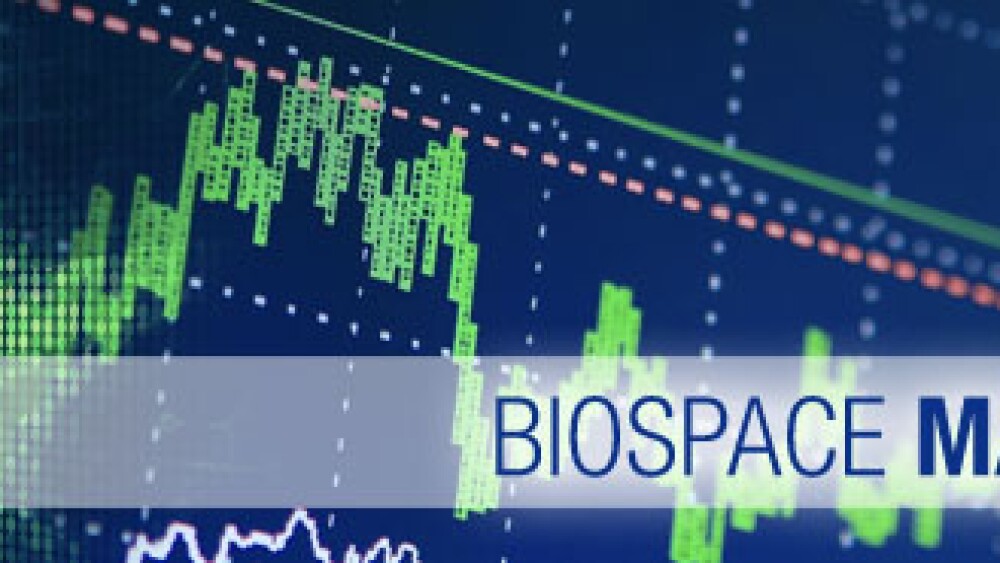December 23, 2014
By Riley McDermid, BioSpace.com Breaking News Sr. Editor
The biotech sector continued its sell-off Tuesday, reaching its lowest point since April despite a historic 18,000-pt high reached by the larger Dow Jones.
Over at the NASDAQ, however, it was a different story, as traders unnerved by yesterday’s hardball move from pharmacy provider Express Scripts had began to shed stock, with some falling marquee name firms like Gilead Sciences, Inc. seeing drops of more than 14 percent before steadying.
Market analysts are still digesting the news that behemoth benefits provider Express Scripts will make AbbVie ‘s newly approved Viekira Pak the exclusive treatment option for patients in their plans with hepatitis C, excluding blockbusters Gilead’s Sovaldi and Harvoni (and their high price tags) in the process.
The formulary decision will start on Jan. 1, 2015 and will be “multi-years,” though a precise time period has not yet been outlined.
The news has some biotech bears worried that a loss of massive profits traditionally coveted by biotech investors in a raging market could be coming to an end, as payers press large companies to keep their costs well in line.
A 12-week course of Harvoni costs around $94,500, while a similar course of Sovaldi will run as much s $84,000. Those price tags have had insurers and public health plans like Medicaid balking at backing the treatment or offering reimbursement.
“For the 25 million Americans that Express Scripts directly covers (whose employers contract directly from Express Scripts) and who have hepatitis C (specifically GT1, around 75 percent of hepatitis C), Express Scripts will only pay for AbbVie’s just-approved hepatitis C regimen Viekira,” wrote Mark Schoenebaum, a medical doctor and biotech analyst for ISI/Evercore, on Monday.
Prior to Monday’s fire sale, the NASDAQ Biotechnology Index had climbed 40 percent in 2014, cramming $7.26 billion into health-care exchange traded funds, according to data compiled by Bloomberg. But that index plummeted 6.1 percent at Monday’s close in New York, the worst one-day drop since February 2009, and continued to fall in late trading Tuesday.
However, some analysts said they felt the sell-off would soon cease, as more details about the deal between AbbVie and Express Scripts came to light. Most notably, that AbbVie did not offer an “outsized” discount to gain access with the company, despite earlier reports it could have lopped as much as 50 percent off its drug’s sticker price.
“We spoke with AbbVie,” said Schoenebaum on Tuesday. “What qualifies as an outsized discount we still don’t know, but we believe anything above 30 percent is an outsized discount.”
Importantly, net direct impact of yesterday’s news is likely less than 5 percent to Gilead’s U.S. business. “If you look at it from a company perspective, it will likely be less than that,” he said. “Key questions remains what is the conversion rate of adoption of Express Scripts clients onto the direct formulary, which we estimate at around 20 percent.”
Overall, Schoenebaum stressed that drug pricing is dependent on three key factors: intensively competitive markets; drugs that are basically interchangeable; and percent private payers.
“We’ve seen pricing issues in insulins and asthma inhalers in 2014 and perhaps something in hepatitis C, [and] those markets all contain these three factors,” he said. “Notably, these three factors would exclude drugs administered by physicians, such as most of oncology, which are administered under Medicare part B.”
In the end, Schoenebaum said he thinks the biotech sector can withstand pricing pressure if research and development productivity is better.
“The last few years have seen both improvements in R&D productivity and pricing,” he said. “We believe continued improvements in R&D productivity may be able to offset any pricing pressure.”





